From the moment she appears on screen, Denise Bryson is a wilful and charismatic presence in Twin Peaks. And from that moment, my head has been spinning—what does it mean to have a transgender character who is this well written but portrayed by a cis actor? Am I allowed to enjoy this? Should I revoke my David Duchovny fandom card, or should I like him even more? My instinct was to put these thoughts into writing (either as an essay, or a Twitter thread) but I hesitated, because I wished neither to pigeon-hole nor ostracise myself. Now I’m pretty happy to do either.
I’m aware that my perspective is limited—though I am transgender myself, I am not a transgender woman, nor was I alive in 1991—and arguably biased, since I am a fan of Duchovny’s other work. Yes, I think he was sublime in this role (although I’m not interested in giving cis people too much credit, so now that I’ve praised Duchovny, I will profusely thank David Lynch and Mark Frost for creating the show and this character, and move swiftly onwards). For the record, I am more interested in asking questions than I am about giving a final answer on what makes good representation, which is something that can hardly be determined by an individual anyway. I hope that in exploring this character I will be able to articulate some parts of my queer worldview that might otherwise go unexpressed.
“I found that wearing women’s clothes relaxed me […] it was a very confusing two weeks”
— Denise Bryson, ‘Masked Ball’
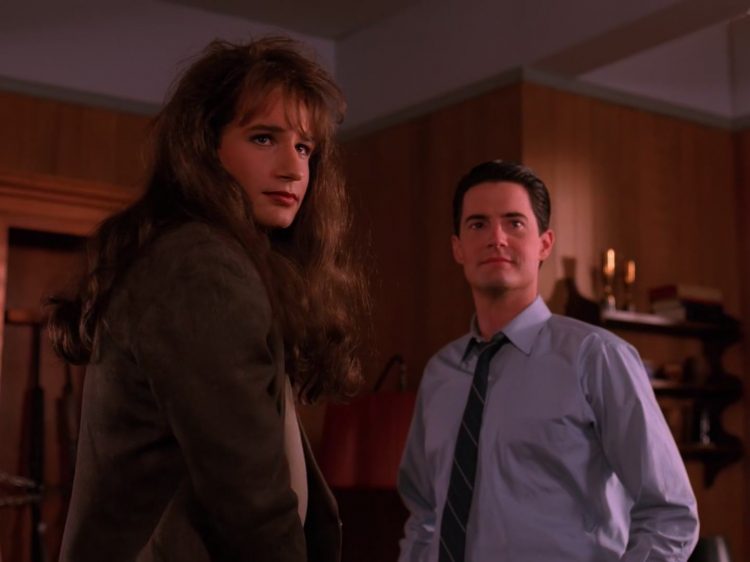
In the episode ‘Masked Ball’, Denise Bryson is introduced as “one of the finest minds of the DEA”, who is conducting an investigation into Agent Cooper. She has a high status both professionally and dramatically; she never relinquishes this status to anyone, only remaining amused and aloof in the face of others’ resistance. She’s not some quirky stranger that Cooper met in Twin Peaks, but someone from his own life, and this matters because you, reader, will come to know (if you don’t already) transgender people in your life, and they won’t be strangers either, they will be your colleagues and friends.
Her unexpected appearance is explained simply: “I prefer Denise if you don’t mind”. In Brad Dukes’ Reflections: An Oral History of Twin Peaks, Kyle MacLachlan noted that “it was a chance for Cooper to reveal his kind of acceptance of people” and this is certainly true. Also in Reflections, Mark Frost says that he thought Cooper’s relationship with Denise would be “an interesting dilemma” for him—to me it doesn’t seem like a dilemma at all. He accepts the fact with well-intentioned curiosity, and they go about their business. Disappointingly, Hawk refuses to even shake her hand, as if queerness might be contagious (a prejudice backed by a decade of AIDS stigma), but this is cheerfully counterbalanced by Cooper and Andy hugging and dancing with her.
Gordon Cole implies Denise is a bit of a troublemaker (“I had enough dirt on you to fill the Grand Canyon”) somewhat evidenced in her playful needling of Ernie Niles. But she also lives up to her “no nonsense” reputation, and is fully committed to doing her job. When she reappears in The Return, we find that she has made the kind of career advancement that would be a milestone for the trans community, were this real life. Chris Nickson noted in his biography of Duchovny, The X Factor, that Denise “was the type of law enforcement who would either make J. Edgar Hoover roll over in his grave, or jump for joy, depending on what you believe about the former FBI head”.
When Denise meets Audrey Horne it is one of my favourite moments of the whole show. Audrey looks at Denise in awe (and maybe a hint of jealousy). “They have women agents!?” she exclaims. “More or less,” Denise replies. Cooper’s remark that he’d “assume (Denise was) no longer interested in girls” is in line with historic misconceptions about transness and sexuality—it used to be believed that attraction to men was a necessary condition of being a trans woman (and vice versa for trans men). This is quickly defied by Denise’s (allebit cryptic) response. Since the ’90s our understanding of homosexual attraction has changed and fans have gladly seized the implication that Denise is not only openly trans but openly gay too.
In ‘The Black Widow’, Denise enters the Double R Diner kitten heels first. She expresses femininity shamelessly, helped by props such as the lipstick or the nail file, which become like an extension of her character (and never a barrier to professional acuity).
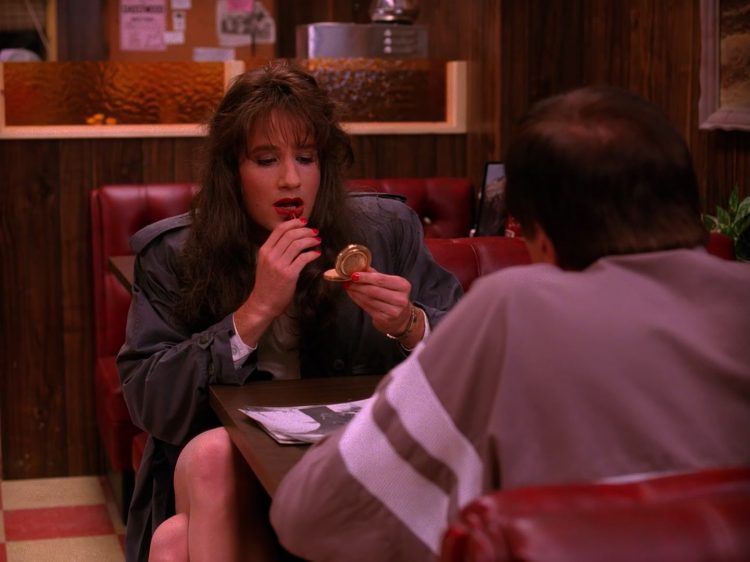
“My recent experience has taught me never to judge too quickly.”
— Denise Bryson, ‘Masked Ball’
The above quote illustrates how Denise’s transition has granted her wisdom, as well as joy. She is excited to tell Cooper “all about (her) new life”, which is so pleasing to hear in immediate contrast to Hawk and Truman’s judgemental stares. I can only speak for myself of course but I have found that an upside to my transition has been getting to know myself without the nonsense impositions of cisgender society; Denise’s comment about getting “more in touch with (her) feelings” clearly defies the expectations that would have been forced on her when she identified as a man. There’s no getting around the fact that life for a transgender person is full of hardship and pain, but when I watch TV for enjoyment, I don’t always want to be reminded of those things. Perhaps it was a result of the general ignorance of the time, but nonetheless I am glad of a trans character whose story is not all about how hard it is to be trans.
Moreover, to say that she isn’t played for laughs is perhaps true but it’s important to note that her storyline and character are not humourless. She has a comedic self-awareness about her situation. At one point she makes a joke about having been a football player, which is oddly in tune with the kinds of jokes me and my friends make about ourselves (I was a Girl Scout and I pee standing up!). In the case of Ernie Niles, Denise seems to enjoy freaking him out (“You’re looking at him.” “Him!?”). Sometimes I think recent concerns about correctness can lead to queer representation that is uncontroversial but lifeless. The key is that the humour is (mostly) directed by Denise, not at her.
Because drug dealing is such a boy’s club, Denise dresses as a man to go undercover. The whole thing reminds me of being in the closet at a same-sex school. She doesn’t suddenly become male, and it is clear from Duchovny’s performance that she is still Denise. In an inversion of stereotypes, it is her masculine get-up that is the disguise, rather than the other way around. Like how other characters might use their unique characteristics to save the day (Log Lady, Nadine etc), Denise uses her true appearance to infiltrate the house where Cooper is being held hostage in ‘Checkmate’. I must be uncharitable for a moment, though, and note that this has some sinister subtext—using Denise’s feminine appearance as a kind of Trojan horse for violence does ring of TERF-y conspiracies about the intentions of trans women in women’s spaces.
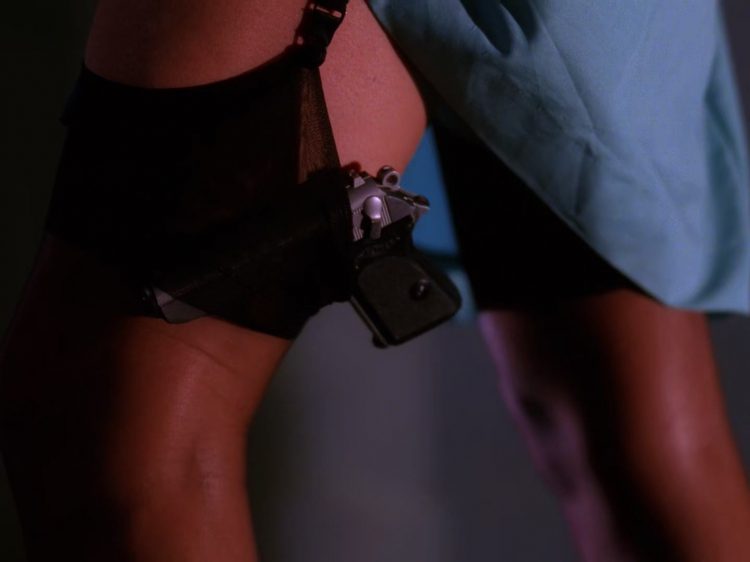
David Duchovny’s X-Files fame has created a halo effect—I was aware of this when, for example, I wrote about his character in Aquarius, as I had noted fans of Duchovny were quick to forgive Sam Hodiak of his sins. Fandom practically necessitates bias, and this is therefore not meant as an accusation, merely an observation. Of course, in the case of Denise, this is retrospective; the creators of Twin Peaks had no way of predicting Duchovny’s career, but nonetheless it directly impacts the way that Denise is perceived nowadays. A queer character played by a good-looking cis-het actor is just a lot easier for fans to swallow, and Denise has essentially become the fandom’s queercard. My issue with this is that reverence for Duchovny blocks thoughtful criticism. It is possible and perhaps necessary to acknowledge that both of these things are true: Duchovny’s performance was nuanced and sensitive, but a cisgender man playing a trans woman perpetuates the harmful misconception that trans women are men playing dress-up. He was great in the role, but that doesn’t mean he was right for it.
Earlier I said that I’m not interested in giving cis people too much credit. Here is what I meant by that: his co-stars were quick to praise Duchovny for his bravery about being in drag, but anyone can pretend to be transgender for a day. Denise is the one who deserves commendation, if anyone. In an unattributed quote from The X Factor, Duchovny recalls being laughed at on set and says this opened his mind to “what it’s like to be ridiculed for being gay by unfeeling men”. The fact remains that he’s not gay, or trans, and afterwards he was able to take off the costume and walk away from the ridicule. Furthermore, as awesome as the “fix their hearts or die” line is, I can’t help but feel that Denise’s only purpose in The Return is for David Lynch to imagine a trans woman thanking him for his allyship.
“I’ve started to focus out beyond the edge of the board […] I’m talking about seeing beyond fear […] about looking at the world with love.”
— Agent Cooper, ‘Masked Ball’
It’s obvious that Twin Peaks is queer as in weird, but not necessarily queer as in showing a profound understanding of the experiences shared by members of LGBT+ community.
However, one of the key philosophies of Twin Peaks is that there is always more to life than meets the eye. Certainly, a world in which people meet their own doubles, where there are shadow selves and true selves, would seem to lend itself to queerness. But as far as explicit examples go, Denise stands alone (for more on queerness in Twin Peaks, see Alison Rumffit’s “transfeminine reading of Laura” in this article from 2020).
“You were a confused and wild thing sometimes […] and when you became Denise, I told your colleagues, those clown comics, to fix their hearts or die.”
— Gordon Cole, The Return Part 4
Most of the online discourse surrounding Denise is about terminology. Before the term “transgender” entered the vernacular, trans people referred to themselves as transsexuals and before that as drag queens/kings and transvestites; these are words that are mostly considered outdated today (their definitions can be misleading) but were once the words of truth for trans people. Unhelpfully, the only time one of these terms is used by Denise, it is not strictly referring to herself, but rather someone she pretended to be undercover. Interviews and dossiers from the ’90s and ’00s almost exclusively use the term “transvestite”, with a shift having happened more recently, especially since The Return, to acknowledge Denise in updated terms as a transgender woman. At the end of the day, these terms are merely incidental, and what matters is the respect (or lack thereof) behind them. A lack of respect would be calling her by the wrong name—if it wasn’t clear what we should call Denise, she herself corrects Cooper when he slips up and uses her old name.
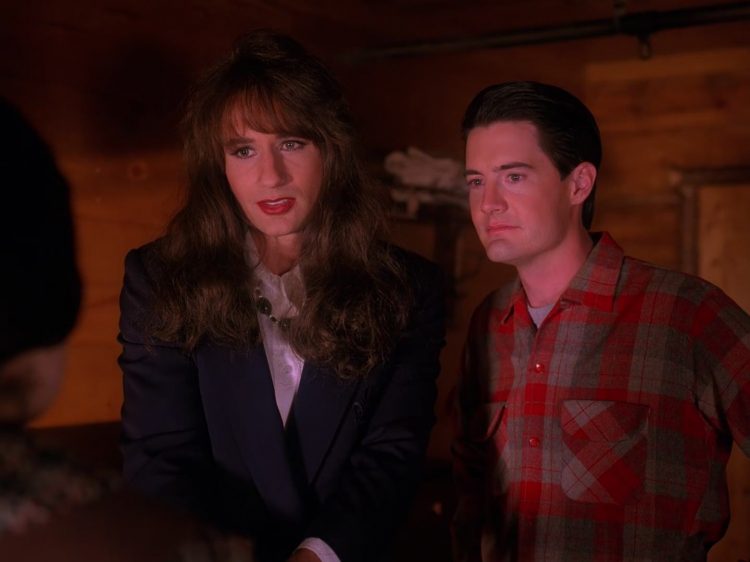
Mark Frost said that he “thought it was an interesting subject that hadn’t really been tackled much, certainly not on network television” (Reflections) and he was right about that. Trans representation wasn’t non-existent, but it was rare, and rarer still was the decency shown to Denise. Denise is not used as a figment of horror the way that transness was in Sleepaway Camp and Silence of the Lambs (the latter of which was released almost concurrently with Twin Peaks) or even, to an extent, in The X-Files.
I can imagine that Denise might have been some Twin Peaks viewers first exposure to positive queerness. She reflects a community that can be inspiring, stubborn, and nervy (and all things considered, I would rather be seen as quirky than dangerous or disgusting). I hope, with the way that TV and queer storytelling has progressed, that she isn’t the last transgender character that you will know and love.

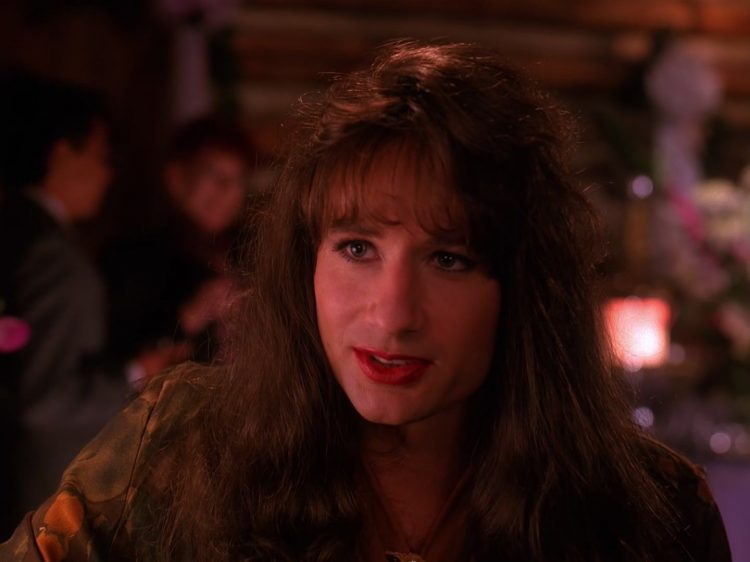
Great article! You are too young however to know how oppressive the 80s were for anyone who was different. If you lived then, you would know that move to have Denise in TP was very progressive at the time. I am not sure even if there was an out trans actor who could have auditioned. I am sure the network producing the show would have discouraged it or there would have been a scandal. Many people had to hide in the shadows in the 80s. Be happy for the freedoms you have now!